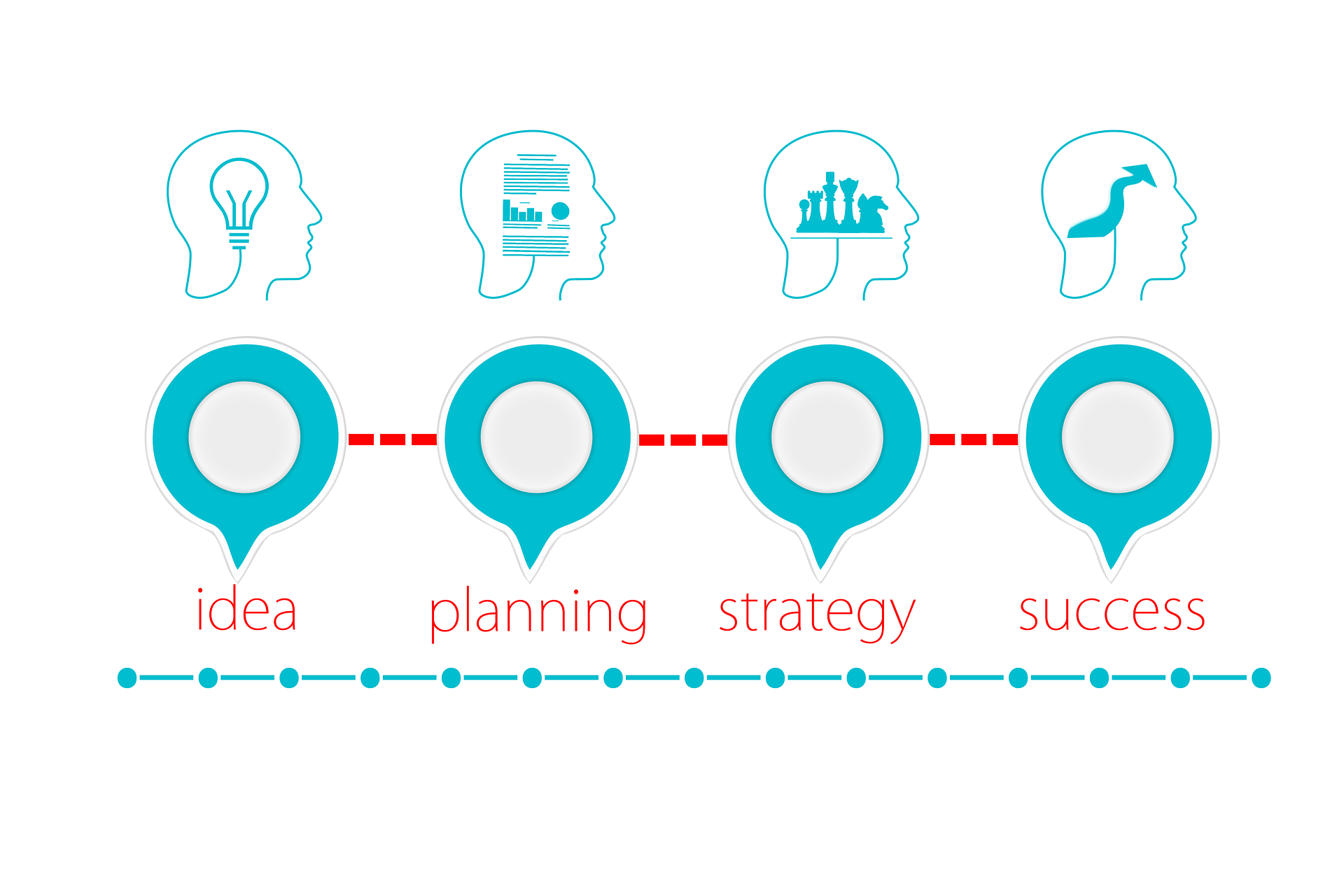What Does Your Dream Business Look Like?
And where are you in your exciting journey to create a dream business... making a positive difference in other people's lives... also, creating a great living for yourself?
- Maybe you've been thinking about starting a business for a long time, but you're afraid, overwhelmed, or confused about getting the ball rolling.
- Or you've taken several concrete steps towards launching and scaling your business, but you feel you've taken a wrong turn somewhere.
- Or perhaps you've started a business, and you're trying to figure out how to take things to the next level... because it's NOT working out the way you hoped.

Listen, because I've got some fantastic news for you...
NO more wasting time, money, or opportunity frantically striving, but getting nowhere fast!
I mean... If you've EVER felt like this - if you've EVER wanted to start your dream business, but for some reason, it just ain't materialized.
Or if you've EVER wondered how to get better results, working less hours so you can spend your valuable time on more important things. Then my friend...
This course is definitely for YOU!
I'm pumped you're here because I'm going to share "8 Business Essentials" for creating your dream business online... helping people all over the world.
In the coming pages, we'll tear down complex systems and give you the specific information you'll need to succeed.
- Unpack what a "dream business" looks like by sharing four characteristics present in one.
- Introduce you to "eight essentials" for starting and scaling a dream business.
- Provide you with an "overview worksheet" you can print and refer to as you complete the remaining lessons.
NOTE: This is the longest lesson in the course because of the worksheet.
So, lets' get started...
four characteristics of a dream business
When you think about setting up a long-term business, the first thing you have to do is answer this simple question...
What Does Your Dream Business Look Like?
You see... many aspiring business owners look at one or two factors (such as profitability). And figure... when they make tons of moolah, only then will they reach that glorious state of happiness.
But the truth is...
While making serious bank is important to business success... it's NOT the only thing. In fact, plenty of people have accomplished this with their organizations, but are experiencing a living nightmare.
And get this...
If you DON'T want to follow in their footsteps, make sure your dream business possesses these four crucial characteristics...
Characteristic #1: Passion-filled.

Your business shouldn't "feel like work." It should be something you enjoy and love doing. But, don't get me wrong, a lot of the processes/tasks involved in the business system can become mundane, repetitive, and soul destroying.
Although (remember), your main objective should always keep you fired up for the long haul. For example... Think of Michael Phelps, winner of 23 Olympic gold medals. This guys started swimming from the age of 7... motivated by his sisters, he soon "learned" to enjoy the activity. His coach during Olympic training was often compared to a "drill sergeant" , pushing Phelps far beyond anything he could envision for himself. (And I'd hazard a guess... at the time, Phelps wasn't to "happy" with the training regime, but pushed on because of his end goal or vision).
Tip: Often learning new skills, feels like hard work. But only until you've mastered these skills. This is when things become enjoyable. So...
"Learn to become friends with uncomfortable feelings, because, when you do... they'll drive you forward... and you'll never "work" another day in your life".
Also...
Your business may NOT be super profitable right off the bat. It takes time to grow... anyone who says different speaks with forked tongue (embellishes the truth).
And you could be "working" long hours to get your business of the ground and still don't have anything to show for it. You might start hating the "process"... and it'll feel like that shitty job you hate already... (the trick is to build your passion in baby steps, over time).
Pick something you like, and if that's the business "process," all the better. I know plenty of people who just love being in business... no matter what they're selling!
Bottom line...
Do something you're going to do anyway... and "learn" to profit from it.
Next...
Characteristic #2: Purposeful
Your business ought to be more than a way to make money. It's a calling, something where you make a difference in people's lives.
We'll talk more on this later, but there needs to be a strong "motivator" for why you set up a dream business that's bigger than you. Ask yourself this question...
How Can I Help People?
Your business needs to have a purpose that's meaningful to YOU... so you know you're not in it, only because you love it or make profit from it... You're also in business because you're changing people's lives for the better!
So, here are three things to accomplish...
- Help others solve a problem.
Examples: Relieve back pain, shed extra pounds, restore broken relationships, overcome bankruptcy, stop smoking. - Help others reach their goals.
Examples: Raise charity funds, homeschooling, write a novel, copywriting. - Help them enjoy and interest.
Examples: Travel on a budget, sell stuff online, Run long distance, restore classic cars.
NOTE: We'll talk about how "Big" a problem, goal, or interest needs to be to build a business around it in an upcoming lesson.
You might also think of this in terms of YOUR legacy. Long after you're gone, the impact of your business is going to live on. So... what kind of impression will you make in the world?
It doesn't have to be worldwide - but if you change the lives for a small select group of people (your audience), then it's worth it.
Next...
Characteristic #3: Profitable
Obviously, you gotta look for something that makes money. That's why a digital business is "dreamy." Because it's a "do it once", and profit from it over and over business model.
Here are some other advantages...
- Profit margins are high, because you don't have the expenses associated with typical brick and mortar stores. No rent, inventory, staff, maintenance, etc. So, almost everything that goes in your pocket is pure profit.
- You can reach a far wider audience from the comfort of your home. In other words, BIG audience, minimal effort. You literally have a global audience at your fingertips. Contrast that with a fixed, limited customer base that depends on local or visiting traffic.
- Your advertising is "targeted." A lot of brick & mortar businesses place expensive (fingers crossed) ads that aren't that effective. But with an online business, you can reach people with laser focused pay per click advertising methods. Which means higher ROIs and more profit in your sky rocket (pocket).
Caveat: With ease of entry (into the marketplace) comes more competition. But we'll deal with that in later lessons.
Characteristic #4: Portable.
Your dream shouldn't tie you down. And it won't when you've got all the "processes" up and running. This is the mistake a lot of new entrepreneurs make when launching their careers. They listen to all the hype about working when you want, where you want, and with whom.
This is a fallacy conjured up to coax people into THE "dream."
On the contrary... REALITY dictates you HAVE to work hard at first... CREATING your dream business (remember what I said about "nurturing your passion," so hard work seems like play?)
Only then can you rest on your laurels and do all the things presented to you by the charlatans who insidiously sell you the dream, NOT the process.
So, there you go...
The four characteristics of a dream business. And as you can see, an information-product business (E-learning) ticks all the boxes.
Eight Essentials For A Dream Business
That's why we'll focus on selling info-products in Dedos' Business Essentials Course... where you'll be learning all about the following...

- MARKET
A "market" is whom you're going to serve. These are the people you've researched to the hilt, so you know how to solve their problems (help them). And you're passionate about because you share a common interest.
Finding the right market is a MUST! - MISSION
Your mission statement/Vision tells people why your business exists and how it does what it does. Giving you a clear purpose... guiding your decision making, helping you stay true to WHO you are. And it helps you stand out in the market sticking to what you do best. - MONETIZE
While you never want to lose sight of the fact you're a problem solver, wanting to help people... this is still a business, NOT a freekin' charity. Of course, charity has it's place. And you'll want to provide free content to your audience to help those who don't have a budget... and WIN those who are yet to become your customers.
(But you're in business to make profits, and rather than you figuring out how to do this, you can use one of my four proven revenue models). - MINIMIZE
Untold amount of people fail because they over-complicate things. To make money (while helping others), all you need are two things... "An Offer" & "A Buyer." Everything else is a matter of scaling... one step at a time. - MODEL
Your business objective is to help individuals in your audience go from someone who doesn't know you, to a subscriber... to a paying customer... to a loyal, satisfied, repeat customer.
This means creating a simple, straightforward, and small (only 4 pieces) "system" to keep people moving from not-a-customer... to repeat customer. And with this "path to profitability" in place, helping (more & MORE of) your audience is much easier to achieve. - MORE
There are 3 Crucial ways to GROW your business and help more people...
Get more customers... Get them to spend MORE per order... and GET them to spend MORE often.
And setting up automated systems to grow your business 24/7 in these areas is the KEY to generating MORE benefit for your audience and more profit for you business over the long-term. - METHODS
The best way to make it easier for you to step through the process of setting up and scaling your dream business is to create time-saving, powerful "systems" for each part of the "process."
When you have your basic steps organized into a mini-blueprint (checklist) of reasonable, reachable activities to complete, you're much more likely to make progress. Bottom line...
You need duplicatable systems and leverage. - MILESTONES
It doesn't matter how much "available" time you have. As long as you create a custom-tailored weekly routine that works with your schedule... you dream business is possible. A massive KEY to consistent growth is to lay down a set of tasks to complete each day, week, month, and quarter.\
Never forget... it's NOT about getting MORE things done... it's about getting the "right" things done that move the needle in ways that count, right NOW!
So, that's what we're going to cover in the remaining lessons, but before we go there. Here's a little addition to keep handy as you crack on with your dream business...
Your Overview Worksheet
I'm including this worksheet to use as we walk through the process lesson by lesson through-out the remainder of the course. So, here's a condensed look at what we'll be covering, along with questions you can answer as we commence...
Lesson 1: Market
Your first step is to choose an IDEAL market that's "evergreen." Meaning, it'll support you for many years to come, and never fizzle out. So, get a pen and list out ALL the potential candidates. Then research them and answer the following questions to narrow down your list to only the BEST!
- Interest
Is there a market actively interested in a topic or problem?
Are YOU interested in the topic or problem? - Dilemma
Is there a specific dilemma around which you can create solutions for your products? - Evergreen
Is the topic/problem one of enduring interest? - Accessible
Can you access the market through traditional advertising methods (both free and paid)? - Lucrative
Is the market profitable?
Lesson 2: Mission
Brainstorming TIME!
Go through each question below and insert as many answers as you can. Then pick the best answer from each question.
- What does your company do?
- How does your company do it?
- Why does your company do it?
Now combine your 3 BEST answers into one succinct mission statement.
Lesson 3: Monetize
The "Big Four" ways to earn MOOLAH online include... content, affiliate, services, and HELPING.
What we're going to do in this worksheet is give an overview of how you'd set-up your business in your chosen market, within each of these methods... and then add the pros and cons of each (according to your own preferences, strengths, weaknesses, etc.) Here we go...
Content
- What would your business look like if you sold content?
- What are the pros of this monetization method?
- What are the cons of this...
Affiliate
- What would your business look like if you were an affiliate?
- What are the pros of this monetization method?
- What are the cons of this monetization method?
Services
- What would you business look like if you sold services?
- Pros of this monetization method?
- Cons of this monetization method?
Helping
- What would you business look like if you sold coaching?
- Pros of monetization method?
- Cons of monetization method?
Based on your answers above... select your monetization method.
Lesson 4: Minimize
This lesson is about taking the minimum 3 steps to achieve results (set up offer, list, and traffic source). Now it's time to plan. Fill in this worksheet...
- What FREE offer will you use to encourage your market to join your mailing list?
- What initial paid offer will you sell to these prospects?
- What type of free content will you upload to your auto-responder to pre-sell prospects on this offer?
- What traffic source do you choose to start with?
- List your plan for getting traffic using this source?
Lesson 5: Model
Now it's time to plan your sales funnel. Answer these questions...
- FREE:
What free offer will you use to attract people into your sales funnel? (This is the same product as question #1 in the last lesson). How will it "naturally" lead to the front-end offer? - FRONT-END:
What type of entry-level product will you sell at a low cost? How will it lead to the foundational offer? - FOUNDATIONAL:
What core product will you sell as your primary offer? How will it lead to your finishing offers? - FINISHING:
What complementary and supplementary offer will you create to further enhance or explain your foundational offer?
List all the ways you'll cross-sell these pieces throughout your sales funnel...
Lesson 6: More
This lesson is about getting and helping more customers... who spend more money... and spend money more often. After you complete the lesson, do the following brainstorming exercises...
- List all the ways you can think of to get more customers.
- List all the ways you can get them to spend MORE money with you.
- List all the ways you can get them to spend more often.
Next, choose the methods from #1 - #3 you definitely want to implement.
Now create a plan (with timelines) detailing exactly how and when you'll implement these methods for making more money. BTW Here's a little report I wrote about sales funnels, to help cement these ideas into your mind >>HERE<<
Lesson 7: Methods
Time to plan your business systems... are you ready?
- List all the "processes" for you business (E.G., setting up a mailing list, website, researching product ideas, hiring, etc.).
- Break these processes into smaller steps, (E.G., part of setting up a site is to set up a blog).
- Now decide which of these processes need systems to streamline the process.
Once you've decided... walk through the lesson's steps to research and develop your own systems for each process.
Lesson 8: Milestones
You can set up and run your business, no matter how much time you have, if you schedule smartly. Fill in this worksheet...
- What tasks do you need to do quarterly?
- What are your monthly tasks?
- Weekly?
- One-time (set up) tasks?
- Which ones are ongoing tasks?
- Rank the order of importance for each task so you can prioritize them?
- How much time can you allocate each week? List your daily allotted time slots.
- Now it's time to create your weekly work schedule by listing exactly what you'll do in each of your daily time slots. Use the lesson as guidance to set this up.
